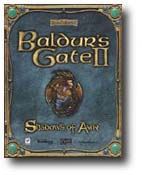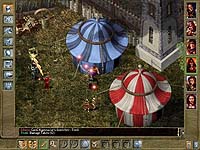  |
 BALDUR'S GATE II: SHADOWS OF AMNReviewed By: Freddie FreemanVOLUNTEER GUEST REVIEWER
Genre: RPG  "Baldur's Gate II: Shadows of Amn" is the best game I've played in recent memory. Let me explain why.
"Baldur's Gate II: Shadows of Amn" is the best game I've played in recent memory. Let me explain why.
In "Baldur's Gate II", you lead a group of adventurers through a perilous journey frought with danger and adventure. It's the stuff of legends, though it can get a bit overwhelming at times due to the sheer amount of paths you can take; this game is extremely non-linear. You CAN play as a character who has spells. However, you can play as other classes as well. I'm partial to the Inquisitor right now—a lawfully good warrior who hunts evil spellcasters (and gets bonuses for attacking them). You CAN be evil in the game—however, it is strongly discouraged. Evil characters usually kill a lot of people, which will make it impossible for them to go anywhere near a civilized town without the guards showing up.
There is mention of other gods in this game (I'm not sure if they're real-world or just made up), but at no time does your character have to choose one of those false gods to follow. Since it's a role-playing game, I like to think that my Inquisitor is a zealous Christian warrior, cutting a swathe through the evil creatures of the lands, protecting the weak and innocent. There is alcohol in the many taverns and inns of the game. There's nothing wrong with a few sips, but you have to exercise self-control, otherwise you'll get drunk as you would in real life. With the fantasy genre comes magic. It can be in the form of weapons, armor, other items, or spells. It doesn't to go deep, however, and everything seems to be pushing for good over evil (if you're playing a good character), as with the wizards and magic of popular Christian authors C.S. Lewis and J.R.R. Tolkien. If you like role-playing or action games, “Baldur's Gate II” comes highly recommended. It isn't half as bad as people make it out to be—most of them judge it before they play it, just because it's based on the AD&D rules. That just means it uses the same “numbers” system, with the dice, damage, and other algorithms. It is not an EVIL game, and your character is presented with moral choices just as in real life.See also our review of "Baldur's Gate".Year of Release—2000 Positive—As a game, this is technically superb. Some may find the supernatural content offensive, but as a Christian this never occurs to me when playing it (or to be accurate its paper-based predecessor, Dungeons and Dragons) as it is very clear that in the spirit of epic fantasy and literature the party are battling all sorts of nasties, and therefore the game is much more difficult to play as an “evil” character. It is worth noting that the original D and D only works as entertainment if the party playing work together. In their role-playing, and therefore in reality, they have to be mutually supportive or their characters come to a quick end, as does the evening's playing session. My Ratings: [4/5] Positive—You know, I played the game twice. Not because I wanted to, but because my system caught a virus and all my data was erased. So when I got the expansion, TOB, I started the game all over. The first time I played, I decided to see how Aerie was going to play out. Well to put it mildly the dialog was BORING. She was always complaining about her situation and needed to be held by the hand every step of the way. The second time, I played as a paladin (you can get the best sword in the game that way), and I decided to see how Viconia played out. That was the most entertaining gameplay I had. Seeing the dialog between a Drow and a Paladin is great. They made an odd couple, but things happened… People change :) …heheh… if you can get past Viconia's tough outer shell, you will find a very complex and in-depth character with ties to the famous Drow, Drizzt. My Ratings: [5/5] …all the dieties mentioned are pantheonic-type dieties (ala Greek or Egyptian myths) taken from the “Dungeons and Dragons” game setting of Forgotten Realms. Some of these dieties are loosely based off of real myths, some were created wholecloth. I thought the original review thoughtful and insightful. One thing I'd like to mention is an OPTIONAL aspect of the game: the NPC (non-player character) romances. In BGII: Shadows of Amn, your PC can develop romantic relationships with one of four other characters (depending upon gender/race/alignment). The romances develop by a series of dialogues with the NPCs, and overall these were extremely well-written. Unfortunately, two of the four romances require that your character sleep with the NPC for the relationship to continue (nothing is shown: it's just text stating that you wish to 'spend the night', and then it flashes to morning). One of these two (Viconia) was the evil romance, but I was definitely upset to see the that Sir Anomen, the knight of the Most Holy Order of the Radiant Heart, would have you 'spend the night' or end the relationship. On the flip side, Jaheira's romance is the only one that does not require you to spend the night with her through both the original game and the expansion. She's an interesting character, and the relationship starts off as a mutual friendship, but grows over the course of the adventure. In another 'good' aligned romance (Aerie) you are actually encouraged NOT to 'spend the night' with her. The character is also encouraged to remain faithful to her, or the relationship will terminate. I thought this was a breath of fresh air, and she was my personal favourite character (besides Minsc & Boo!). Unfortunately if you have the expansion 'Throne of Bhaal', Aerie's innocence is somewhat lost, and if you continue your relationship you do spend the night with her (no dialogue choices offered). This is resolved somewhat by being given the option to marry her. You are encouraged to marry her (albeit after the fact), and remain by her side when she becomes with child. Also of note, though not a romance option, is that in the BGII expansion you meet up with your evil half-brother (Sarevok, the big bad boss of BG1). He's been defeated by you (twice), and now he's back and he's still evil. However, if you bring him along and show him the good path (leading by example) your character can convince him to change his change his outlook and 'get saved' as it were. There are other examples like this throughout the game, too numerous to mention. My Ratings: [4/5] Comments from Young People… The gods are not real world gods so no need to worry there. The path of darkness is as easily accessible as the path of good, but this is much the same as in the real world. The game is brilliant. The temptations of the evil are very heavily influenced by biblical temptations used by the devil and his minions. My Ratings: [5/5] Disclaimer: The opinions expressed in this Christian Spotlight review are those of the reviewer (both ratings and recommendations), and do not necessarily reflect the opinions of Films for Christ or the Christian Answers Network.
Christian Spotlight Guide2Games is part of Christian Answers. Copyright © Films for Christ. • “Christian Spotlight’s Guide to Games” and “Guide2Games” are service marks of Films for Christ.  |
 Your character is the son of the Lord of Murder. An evil mage tries to tempt you to embrace your inner self and become a bloodthirsty, power-hungry ruler. You have the choice to renounce that, however, and fight to become a goodly hero.
Your character is the son of the Lord of Murder. An evil mage tries to tempt you to embrace your inner self and become a bloodthirsty, power-hungry ruler. You have the choice to renounce that, however, and fight to become a goodly hero.